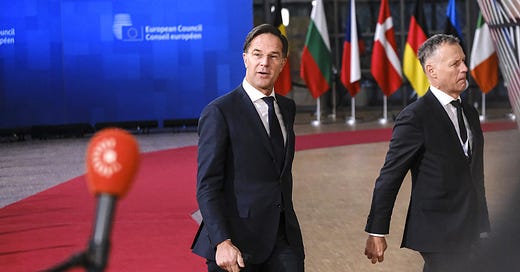Dutch Parties in Rush to Do Budget Deal
The government must agree cuts or tax increases before parliament goes on summer recess.

The ruling parties in the Netherlands are in a rush to do a budget deal before parliament goes on summer recess.
In addition to spending, the four parties — two liberal, two Christian democrat — need to agree on asylum reform, more ambitious climate legislation and a resolution to the Netherlands’ farm crisis.
The issues are connected. Raising climate-related taxes, for example on diesel or meat, could stave off spending cuts. Reducing ammonia pollution from farms unlocks permits needed to build homes for refugees.
Why austerity is needed
The government must submit a revised spending plan to parliament by the end of May in order to give lawmakers time to review and debate it before they break for summer vacation.
A cap on energy bills and compensation for the victims of earthquakes caused by drilling for natural gas necessitate either spending cuts or tax increases.
The government capped consumer prices of electricity and gas last year, when inflation reached a postwar record of 13.6 percent. It also raised child and housing benefits and cut personal income tax. The total costs have yet to be added up, but the government budgeted €23.5 billion for the energy price cap alone.
Provincial governors in the gas region of Groningen have asked for €30 billion to repair homes damaged by earthquakes. The government offered €20 billion.
The coalition parties have agreed to exempt defense from austerity. All other departments must propose savings.
Asylum
Between 67,000 and 76,000 asylum requests are expected this year, more than the Dutch immigration authorities say they can handle. Last year, the Immigration and Naturalization Service was able to process about 30,000 asylum claims. Some asylum seekers had to sleep in the open air outside the country’s primary application center for lack of space.
16,000 foreign nationals who have been granted asylum remain in temporary shelters, because they can’t afford to buy or rent a home and there isn’t enough social housing.
Rutte has called for EU-wide asylum reforms:
Enforcing the so-called Dublin Regulation, which requires asylum seekers to register in the first EU country they arrive in.
Sanctioning visa partners that don’t control their border, like Serbia.
Using developmental aid, trade and visas as levers to cut irregular migration and improve returns, especially to countries in North and West Africa.
He has the support of Denmark and Italy, but not of D66, the second party in his government, and the Christian Union, the fourth. They oppose sending asylum seekers back before their claim has been reviewed in the Netherlands.
Climate
The Netherlands is not on track to reduce greenhouse emissions by 55 percent this decade. Climate minister Rob Jetten of the left-liberal D66 has proposed to raise taxes on fuel and the purchase of diesel cars to encourage more electric driving. Rutte’s party, the right-liberal VVD, is wary.
Keep reading with a 7-day free trial
Subscribe to Atlantic Sentinel to keep reading this post and get 7 days of free access to the full post archives.



